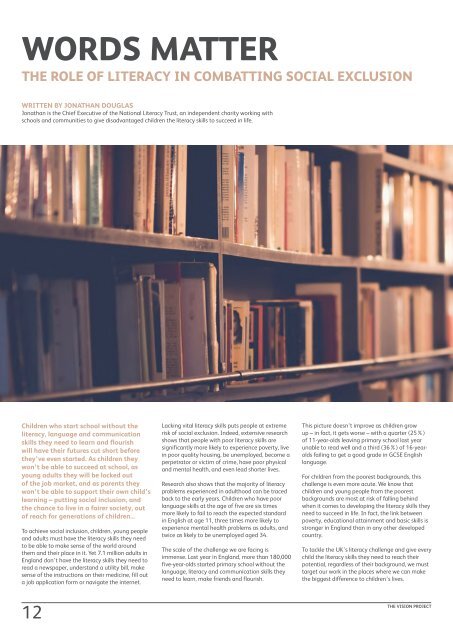The Vision Project
Throughout 2019, Developing Health & Independence (DHI), have been marking their 20th anniversary as a charity by looking to the future. Through articles, events and podcasts, they've asked people to answer the question of how we can achieve their vision of ending social exclusion. This collection of articles includes the contributions of experts from across public life and the political spectrum.
Throughout 2019, Developing Health & Independence (DHI), have been marking their 20th anniversary as a charity by looking to the future. Through articles, events and podcasts, they've asked people to answer the question of how we can achieve their vision of ending social exclusion. This collection of articles includes the contributions of experts from across public life and the political spectrum.
You also want an ePaper? Increase the reach of your titles
YUMPU automatically turns print PDFs into web optimized ePapers that Google loves.
WORDS MATTER<br />
THE ROLE OF LITERACY IN COMBATTING SOCIAL EXCLUSION<br />
WRITTEN BY JONATHAN DOUGLAS<br />
Jonathan is the Chief Executive of the National Literacy Trust, an independent charity working with<br />
schools and communities to give disadvantaged children the literacy skills to succeed in life.<br />
Children who start school without the<br />
literacy, language and communication<br />
skills they need to learn and flourish<br />
will have their futures cut short before<br />
they’ve even started. As children they<br />
won’t be able to succeed at school, as<br />
young adults they will be locked out<br />
of the job market, and as parents they<br />
won’t be able to support their own child’s<br />
learning – putting social inclusion, and<br />
the chance to live in a fairer society, out<br />
of reach for generations of children...<br />
To achieve social inclusion, children, young people<br />
and adults must have the literacy skills they need<br />
to be able to make sense of the world around<br />
them and their place in it. Yet 7.1 million adults in<br />
England don’t have the literacy skills they need to<br />
read a newspaper, understand a utility bill, make<br />
sense of the instructions on their medicine, fill out<br />
a job application form or navigate the internet.<br />
Lacking vital literacy skills puts people at extreme<br />
risk of social exclusion. Indeed, extensive research<br />
shows that people with poor literacy skills are<br />
significantly more likely to experience poverty, live<br />
in poor quality housing, be unemployed, become a<br />
perpetrator or victim of crime, have poor physical<br />
and mental health, and even lead shorter lives.<br />
Research also shows that the majority of literacy<br />
problems experienced in adulthood can be traced<br />
back to the early years. Children who have poor<br />
language skills at the age of five are six times<br />
more likely to fail to reach the expected standard<br />
in English at age 11, three times more likely to<br />
experience mental health problems as adults, and<br />
twice as likely to be unemployed aged 34.<br />
<strong>The</strong> scale of the challenge we are facing is<br />
immense. Last year in England, more than 180,000<br />
five-year-olds started primary school without the<br />
language, literacy and communication skills they<br />
need to learn, make friends and flourish.<br />
This picture doesn’t improve as children grow<br />
up – in fact, it gets worse – with a quarter (25%)<br />
of 11-year-olds leaving primary school last year<br />
unable to read well and a third (36%) of 16-yearolds<br />
failing to get a good grade in GCSE English<br />
language.<br />
For children from the poorest backgrounds, this<br />
challenge is even more acute. We know that<br />
children and young people from the poorest<br />
backgrounds are most at risk of falling behind<br />
when it comes to developing the literacy skills they<br />
need to succeed in life. In fact, the link between<br />
poverty, educational attainment and basic skills is<br />
stronger in England than in any other developed<br />
country.<br />
To tackle the UK’s literacy challenge and give every<br />
child the literacy skills they need to reach their<br />
potential, regardless of their background, we must<br />
target our work in the places where we can make<br />
the biggest difference to children’s lives.<br />
12<br />
THE VISION PROJECT




